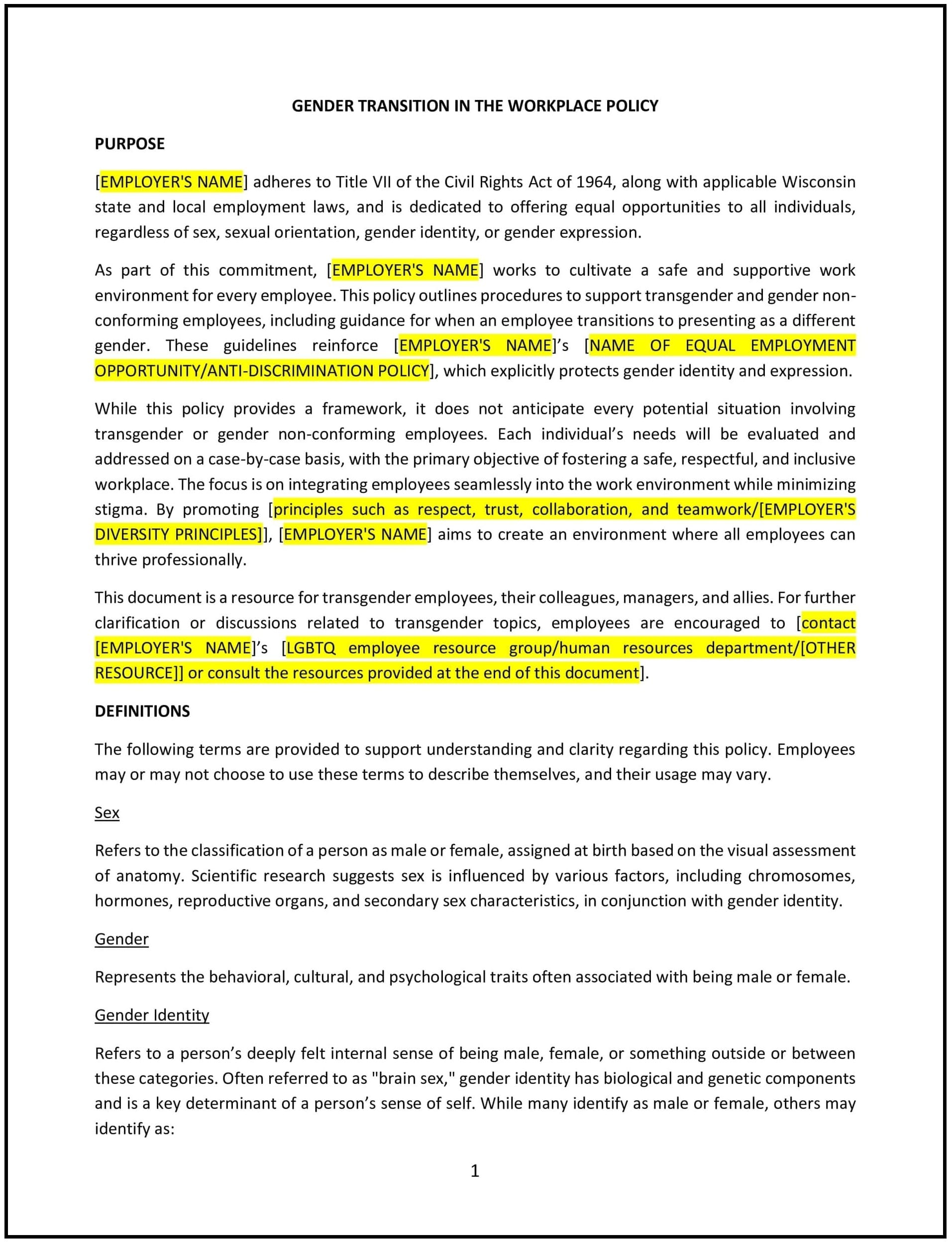Gender transition in the workplace policy (Wisconsin): Free template
Got contracts to review? While you're here for policies, let Cobrief make contract review effortless—start your free review now.

Customize this template for free
Gender transition in the workplace policy
A gender transition in the workplace policy helps Wisconsin businesses create a supportive and inclusive environment for employees undergoing gender transition. This policy outlines the company's commitment to supporting employees through their transition, ensuring their rights are respected, and promoting a workplace free from discrimination. It also establishes guidelines for managing workplace adjustments and ensuring that employees have access to the necessary resources and support.
By implementing this policy, businesses can foster a culture of inclusion, reduce the risk of discrimination claims, and enhance employee morale and productivity by supporting all employees, regardless of gender identity.
How to use this gender transition in the workplace policy (Wisconsin)
- Define gender transition: Clarify what constitutes gender transition, including changes in gender identity, name, pronouns, and appearance. Recognize that gender transition is a personal journey that may vary from one individual to another.
- Establish confidentiality guidelines: Ensure that any information related to an employee’s gender identity or transition is kept confidential and shared only with those who need to know in order to support the employee or implement workplace adjustments.
- Address name and pronoun changes: Set clear procedures for updating employee records, including names and pronouns, to reflect the employee’s gender identity. This includes updating internal systems, email addresses, business cards, and other official documents.
- Provide a supportive work environment: Ensure that all employees understand the importance of respecting an individual’s gender identity and using the correct name and pronouns. Include training for staff on gender identity, gender pronouns, and the importance of creating an inclusive workplace.
- Address workplace accommodations: Outline how the company will support employees through their transition, including adjustments to uniforms, restrooms, changing rooms, and access to gender-neutral spaces where possible.
- Offer employee support resources: Provide employees with information on available support, including counseling services, support groups, or local LGBTQ+ resources. Encourage employees to seek assistance as needed and ensure that they feel supported throughout their transition.
- Implement non-discrimination policies: Reinforce the company's commitment to a workplace free of discrimination, harassment, and retaliation based on gender identity. Employees should be informed that any violations will be addressed promptly.
- Promote an inclusive culture: Encourage managers and leaders to create a workplace culture that is respectful of all gender identities, where employees feel comfortable being their authentic selves. Offer training on diversity, equity, and inclusion to foster understanding and reduce bias.
- Update benefits and policies: Ensure that benefits packages, including healthcare, are inclusive of gender-affirming treatments or services, such as hormone therapy, surgeries, and mental health support. Review other company policies to ensure they are inclusive of gender identity.
Benefits of using this gender transition in the workplace policy (Wisconsin)
This policy offers several benefits for Wisconsin businesses:
- Supports employee well-being: By providing a supportive and inclusive environment, the policy helps employees feel valued, respected, and able to perform their best work during their transition.
- Promotes a positive workplace culture: A clear commitment to inclusion and respect for all employees fosters a positive, collaborative work environment and enhances overall employee morale.
- Reduces legal risks: Implementing a gender transition policy helps businesses comply with anti-discrimination laws, including federal and Wisconsin state laws protecting against discrimination based on gender identity.
- Enhances reputation: Businesses that demonstrate a commitment to diversity and inclusion are viewed as progressive and socially responsible, which can enhance their reputation and attract top talent.
- Increases employee retention: By supporting employees through gender transition, businesses foster loyalty and reduce turnover, as employees feel supported and valued in their roles.
- Boosts diversity and inclusion efforts: This policy can serve as part of a broader diversity, equity, and inclusion strategy, helping to ensure that all employees, regardless of gender identity, feel welcome and engaged.
Tips for using this gender transition in the workplace policy (Wisconsin)
- Communicate the policy clearly: Ensure that all employees are aware of the gender transition policy and understand how it promotes an inclusive, supportive environment. Provide clear guidelines on how employees can request support and make any necessary adjustments.
- Train employees and managers: Provide training for employees, especially managers, on how to create a supportive environment for employees undergoing gender transition. Training should include the proper use of gender-neutral pronouns and language.
- Monitor the implementation of the policy: Regularly assess how well the policy is being implemented and whether employees are utilizing the resources provided. Make adjustments as necessary to address any challenges or feedback from employees.
- Ensure confidentiality: Protect employees' privacy by ensuring that all information related to their gender identity or transition is handled confidentially and shared only with those who need to know for workplace adjustments or legal purposes.
- Be proactive in offering support: Rather than waiting for employees to raise concerns, proactively check in with employees undergoing gender transition to ensure that they have the support they need, including accommodations and resources.
- Regularly update the policy: Review and update the policy regularly to ensure it remains aligned with current best practices, legal requirements, and the evolving needs of the workforce.